Module 2 Unit 1 They don't sit in rows课件+音频(共42张PPT,含内嵌视频) 外研版九年级下册
文档属性
| 名称 | Module 2 Unit 1 They don't sit in rows课件+音频(共42张PPT,含内嵌视频) 外研版九年级下册 |
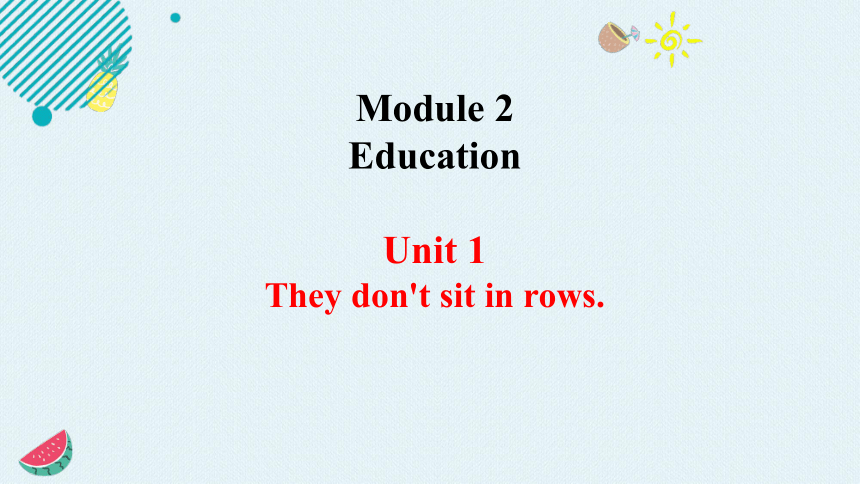
|
|
| 格式 | pptx | ||
| 文件大小 | 27.0MB | ||
| 资源类型 | 教案 | ||
| 版本资源 | 外研版 | ||
| 科目 | 英语 | ||
| 更新时间 | 2024-11-08 12:54:34 | ||
图片预览

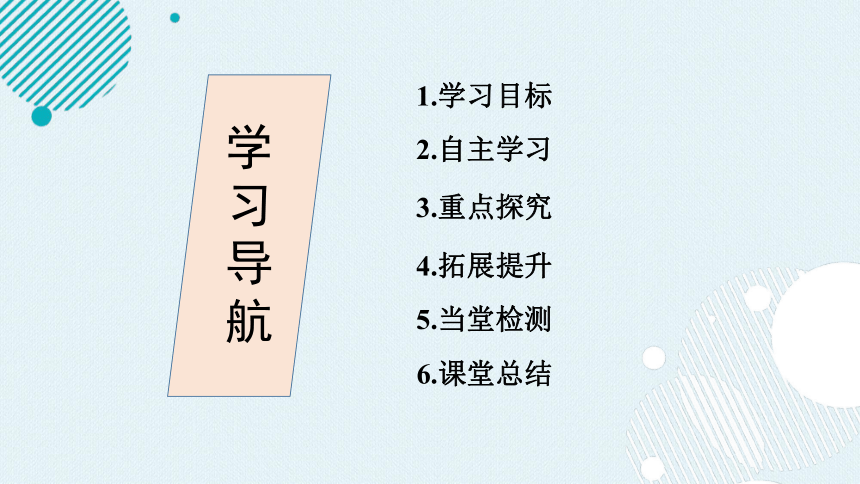
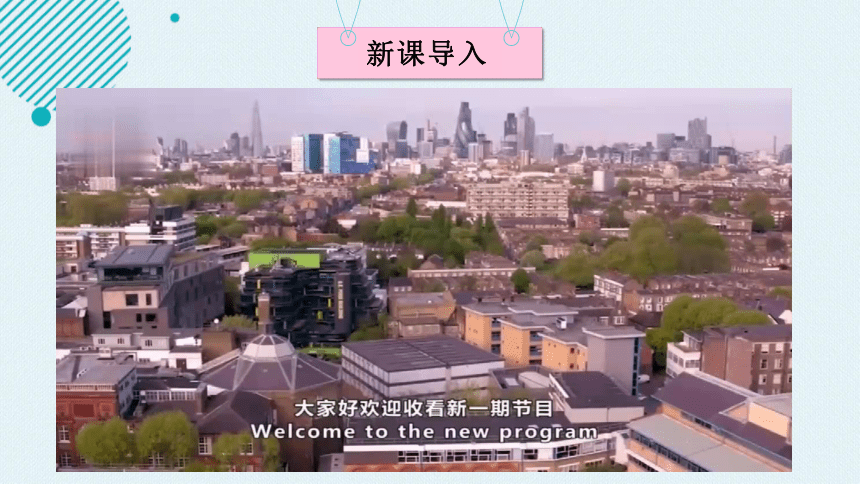
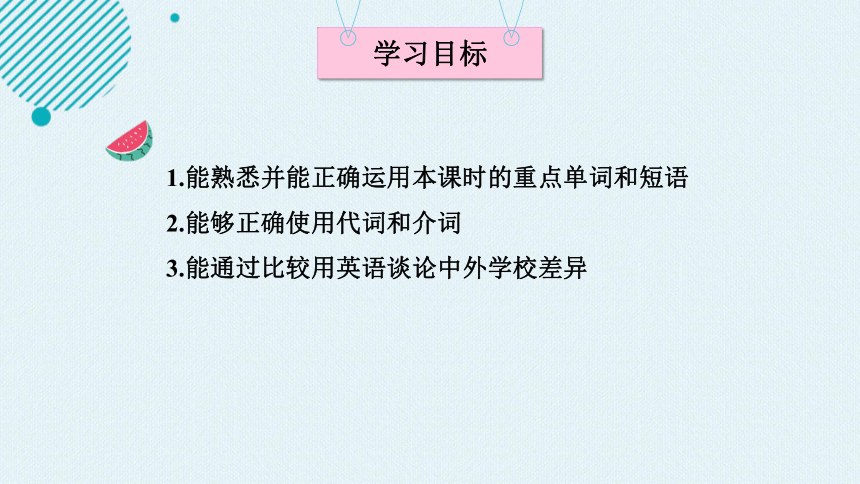
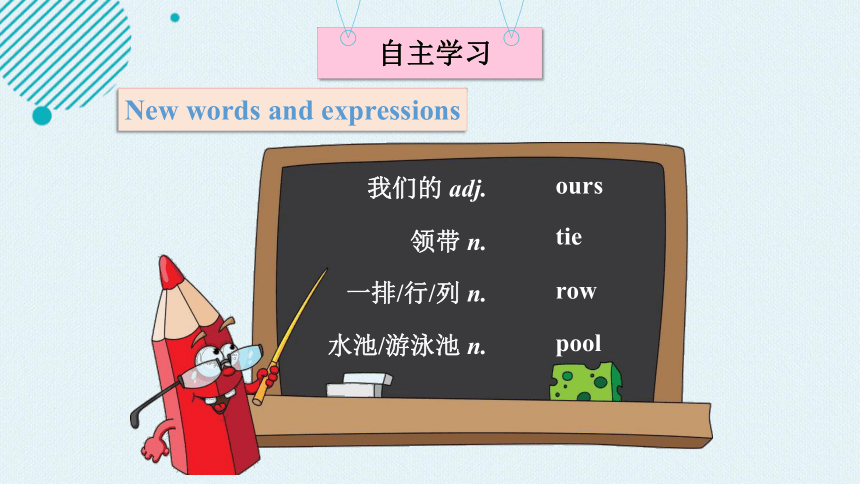

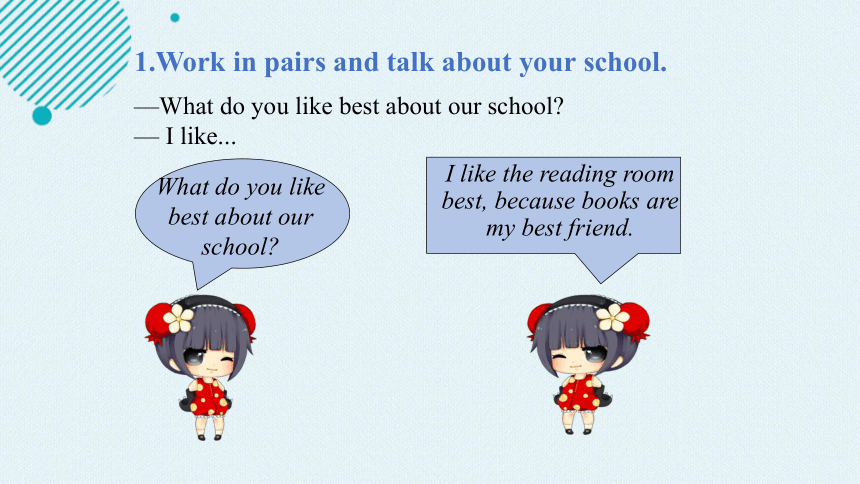
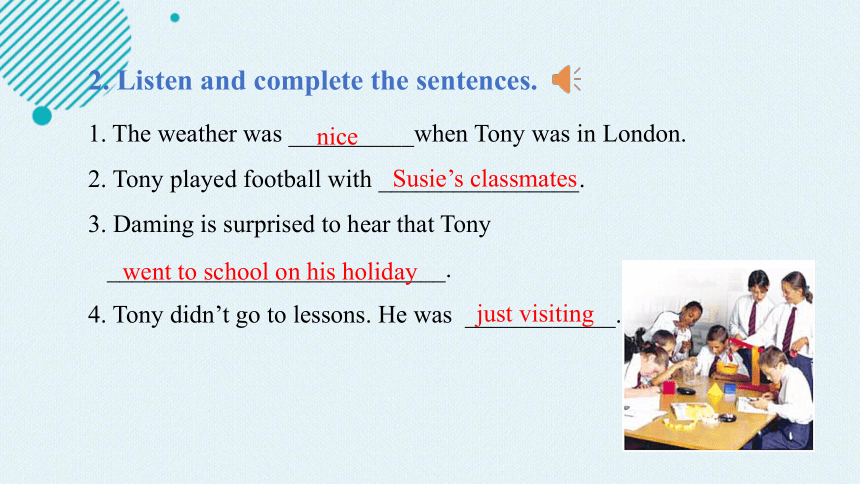
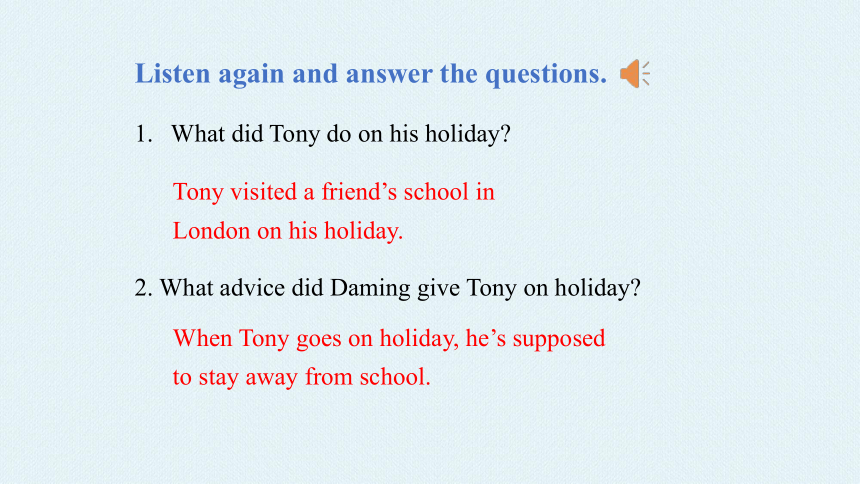
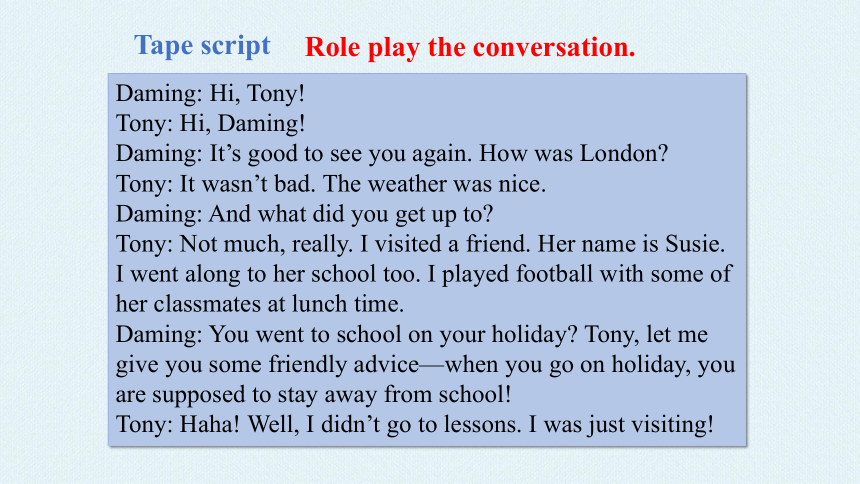

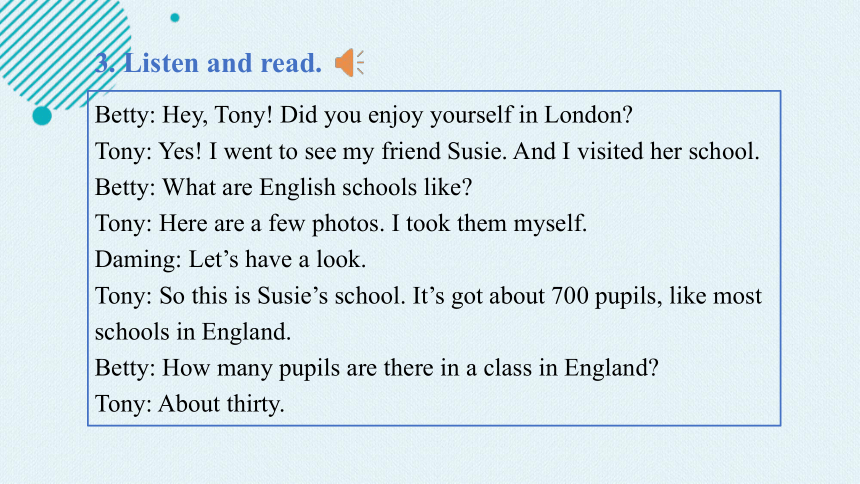
文档简介
(共42张PPT)
Module 2
Education
Unit 1
They don't sit in rows.
1.学习目标
3.重点探究
2.自主学习
学习导航
5.当堂检测
6.课堂总结
4.拓展提升
新课导入
1.能熟悉并能正确运用本课时的重点单词和短语
2.能够正确使用代词和介词
3.能通过比较用英语谈论中外学校差异
学习目标
自主学习
New words and expressions
我们的 adj.
ours
领带 n.
tie
一排/行/列 n.
pool
水池/游泳池 n.
row
重点探究
Is school fun
What’s your school like
What do you like best about your school
Disscussion
I like the reading room best, because books are my best friend.
What do you like best about our school
1.Work in pairs and talk about your school.
—What do you like best about our school
— I like...
The weather was __________when Tony was in London.
2. Tony played football with ________________.
3. Daming is surprised to hear that Tony
___________________________.
4. Tony didn’t go to lessons. He was ____________.
2. Listen and complete the sentences.
nice
Susie’s classmates
went to school on his holiday
just visiting
What did Tony do on his holiday
2. What advice did Daming give Tony on holiday
Tony visited a friend’s school in London on his holiday.
Listen again and answer the questions.
When Tony goes on holiday, he’s supposed to stay away from school.
Tape script
Role play the conversation.
Daming: Hi, Tony!
Tony: Hi, Daming!
Daming: It’s good to see you again. How was London
Tony: It wasn’t bad. The weather was nice.
Daming: And what did you get up to
Tony: Not much, really. I visited a friend. Her name is Susie. I went along to her school too. I played football with some of her classmates at lunch time.
Daming: You went to school on your holiday Tony, let me give you some friendly advice—when you go on holiday, you are supposed to stay away from school!
Tony: Haha! Well, I didn’t go to lessons. I was just visiting!
What is life like in a British school How much do you know about it
英国教育体系分为三大部分:小学(5岁到11岁)、中学(11岁到18岁)和高等教育。在英国,16岁的学生需要参加普通中等教育证书考试。考试结果分为A*-G各个等级,得到五个A*-C结果的学生通常会继续学习两年,参加三科(或以上)课程的中学高级水平考试(A-Level)。本科院校将根据学生该考试的结果进行录取。
3. Listen and read.
Betty: Hey, Tony! Did you enjoy yourself in London
Tony: Yes! I went to see my friend Susie. And I visited her school.
Betty: What are English schools like
Tony: Here are a few photos. I took them myself.
Daming: Let’s have a look.
Tony: So this is Susie’s school. It’s got about 700 pupils, like most schools in England.
Betty: How many pupils are there in a class in England
Tony: About thirty.
Daming: We have forty in our class. So ours is a bit bigger. Look, everyone is wearing a jacket and tie!
Tony: Yes, every student wears school clothes in England.
Daming: And everyone is sitting around tables in the classroom.
Tony: That’s right. They don’t sit in rows. Look at the swimming pool and the huge sports ground. Most English schools have sports grounds. Kids there really enjoy playing football.
Daming: We like playing football too. And we also have an excellent swimming team.
Betty: I hope I can visit Susie’s school one day. It looks really great.
Tony: Our school is great too, and we have more students here. This means more people to play with.
Betty: And more friends too.
Now complete Susie's column in the table.
Susie's school Your school
Number of pupils in the school
Number of pupils in a class
Arrangement of seats in the classroom
Sports areas
about 700 pupils
about 30 pupils
sit around tables
sports ground
4. Answer the questions.
1. Who did Tony visit in London
2. How did Tony get the photos of Susie’s school
3. Which class is a bit bigger, Susie’s or Daming’s
4. What does Betty hope to do one day
He visited his friend Susie in London.
He took the photos of Susie’s school himself.
Daming’s class is a bit bigger.
She hopes she can visit Susie’s school one day.
How much do you know about English education
Let’s list some differences.
sit around the table
sit in rows
30 pupils
40 pupils
<
a little bigger
Differences of education
wear a jacket and tie
wear school clothes
less than one hour
more than one hour
5. Complete the passage with the correct form of the words in the box.
enjoy pool row tie wear
Pupils in England do not sit in (1)_____ in the classroom. They sit around tables. Everyone (2)__________ a jacket and (3)____. Most schools have sports grounds, and English children (4)______ playing football, just as pupils in China do. Some English schools have swimming (5)______, but not all of them do.
rows
wears
tie
enjoy
pools
Everyday English
Did you enjoy yourself
Let’s have a look.
It looks really great.
Did you enjoy yourself ---- used to ask if a person enjoyed an activity.
Let’s have a look. ---used to make a request to see something.
It looks really great. ---used to say that something is impressive.
Betty: Hey, Tony! Did you enjoy yourself in London
Tony: Yes! I went to see my friend Susie. And I
visited her school.
Betty: What are English schools like
Tony: Here are a few photos. I took them myself.
6. Read and predict which words the speaker is likely to stress.
Now listen and check.
7. Work in pairs. Read the conversation in Activity 6 aloud.
Hey, Tony! Did you enjoy yourself in London
What are English schools like
Yes! I went to see my friend Susie. And I visited her school.
Here are a few photos. I took them myself.
8.Complete the Your school column in Activity 3.
Susie’s school Your school
Number of pupils in the school
Number of pupils in a class
Arrangement of seats in the classroom
Sports areas
700
30
sit around tables
sports ground
what both schools have
what one school has but the other does not
Now work in pairs and compare your school with Susie's school. Say:
● what both schools have
Both schools have the sports ground.
● what one school has but the other doesn’t
Our school has a big library ,
but Susie’s school doesn’t.
Both schools are very nice. Both schools have a few science laboratories, a music room, a swimming pool and a huge sports ground. Our school has a big library, but Susie’s school doesn’t. Susie’s school has a hall for concerts, but our school doesn’t. There are 64 pupils in a class in our school, but there are only 30 pupils in a class in Susie’s school.
Possible answer:
拓展提升
Language points
Did you enjoy yourself in London
你在伦敦玩得开心吗?
enjoy oneself 玩得开心、玩得高兴
= have fun;
= have a good time
We had a good time at Disneyland.
我们在迪士尼乐园玩得开心极了。
enjoy (doing) sth.喜欢(做)某事
enjoy
teach
hurt
introduce
kill
help
by
+反身代词
(动词或介词by后)
玩得开心
自学
弄伤自己
自我介绍
自杀
随意吃点…
靠…自己
James teaches________Chinese. Nobody helps____.
Help__________to some fish, boys and girls.
Miss Smith finished the hard work by_________.
himself
him
yourselves
herself
2. What are English schools like
英国的学校怎么样?
What is …like …怎么样?
① 要求对方对特定事物进行描述。
—What was the exam like 这次考试怎么样
—It was very difficult. 难极了。
② 询问天气情况。
What was the weather like 天气怎么样
③ 可指人的外表,也可指人的性格或品质。
—What is she like 她长得如何
—Very beautiful. 长得很漂亮。
—What is she like 她是怎样一个人
—She is very kind. 她很友好。
3. So ours is a bit bigger.
所以我们的班级大一点。
a bit 和 a little都作“稍微;一点儿”
二者的主要用法如下:
① a bit 和 a little 在肯定句中修饰动词、形容词、
副词及其比较级,可以换用,表示“一点儿”。
The speaker spoke up a bit / a little loudly so as to make himself heard more clearly.
演讲者把嗓音提高一点,以便使别人听得清楚。
② a bit 和 a little 在否定句中,意思正好相反。
not a bit = not at all 一点儿都不
not a little = very (much) 很、非常
I’m not a bit tired. = I’m not tired at all.我一点也不累。
I’m not a little tired. = I’m very tired.我非常累。
③ a little可以直接作定语修饰名词,而a bit则要在后面加of 构成短语才能作定语,两者都只能修饰不可数名词。
There's only a little / a bit of food left for lunch.
午餐只剩一点儿食品了。
4. Look, everyone is wearing a jacket and tie!
看,每个人都穿西装打领带!
wear, put on , dress, be in都有“穿戴”的意思
① wear表示状态,意思是:穿着(衣物) ;戴着 (眼镜、帽子、手表等饰品);留着(胡须、头发等);呈现,流露出(…表情)
He wears his hair long. 他留着长发。
He wore a puzzled look on his face.
他脸上流露出迷惑不解的神情。
在表示“穿着”时, wear和put on可以互换。
② put on 穿上;戴上 强调“穿”“戴”的动作,后接衣服、鞋帽等。
其反义词: take off (脱去) ,指脱去衣物鞋帽
She put on her coat and went out.
她穿上大衣出去了。
③ be in 穿着,表示状态,in表示衣服或衣服颜色的词,着重于服装的款式或颜色。
Do you know the woman in red
你认识那个穿红衣服的女人吗?
The man in uniform is a policeman.
那个穿着制服的人是警察。
④ dress 既可表示动作也可表示状态。
I saw a man dressed in black.
我看见了一个穿着黑色衣服的人。
dressed是过去分词作定语,作“穿着”(wearing) 解,
表示状态, 常用结构 be dressed in
I saw a man dressing in black.
我看见一个人正在穿黑色的衣服。
dressing是不及物动词dress的现在分词形式,表示“穿 (衣服)”(putting on a dress)的意思,表动作
The mother is dressing her baby.
母亲正为婴孩穿衣。
dress sb. 给…穿衣,dress是及物动词
5. They don’t sit in rows.
他们不坐成一排一排的。
sit in a row 坐成一排
sit around 围坐在……
stand in a row 站成一排
They are sitting around the table and debating.
他们正围坐在桌子旁进行讨论。
The students stood in a row.
学生们站成一排。
6. I hope I can visit Susie’s school one day.
希望我有一天可以去苏西的学校。
one day意为“某一天”、“有一天”,既可用于过去时中,也可用于将来时中。如:
One day we’ll both get to see New York.
总有一天我俩都有机会看看纽约。
One day the temperature was 30℃.
有一天温度达到三十摄氏度。
If you drive so fast, you’ll run down someone some day.
你要是开得这么快,总有一天会撞伤人的。
some day(或someday)也有“某一天”之意,但它指的是“将来的某一天”,要用将来时。如:
当堂检测
一、单词拼写
1. Your school is very big, but _________(我们的) is even bigger.
2. In some schools in our city, students must wear uniforms and _________(领结) to school.
3. There are two big swimming _________(池塘) in our town and I often go swimming.
4. Unlike yours, there are about 40 students in my class and we always sit in _______(排).
5. Did he enjoy ________(他自己) in the park yesterday
ours
ties
pools
rows
himself
二、完成句子。
1.孩子们,请站成一行。
Boys and girls,please stand________ ________ ________.
2.将来有一天我们能去火星旅行。
We’ll be able to travel to Mars _____ ______.
3.他们学校有一个大游泳池。
There is a________ ________ ________ in their school.
4.没有人教他画画。他是自学的。
Nobody taught him drawing. He learned it ________ _________.
5.格林先生在会议上看到格林夫人,感到很惊讶。
Mr Green________ ________ ________see Mrs Green at the meeting.
in a row
one day
large swimming pool
by himself
was surprised to
课堂总结
Module 2
Unit 1
1.了解英国的教育和学校的日常生活
2.通过比较用英语谈论中外学校差异
重点单词和短语:
ours, tie, row, pool, have a look, swimming pool, one day,play with, hope to do sth.
Module 2
Education
Unit 1
They don't sit in rows.
1.学习目标
3.重点探究
2.自主学习
学习导航
5.当堂检测
6.课堂总结
4.拓展提升
新课导入
1.能熟悉并能正确运用本课时的重点单词和短语
2.能够正确使用代词和介词
3.能通过比较用英语谈论中外学校差异
学习目标
自主学习
New words and expressions
我们的 adj.
ours
领带 n.
tie
一排/行/列 n.
pool
水池/游泳池 n.
row
重点探究
Is school fun
What’s your school like
What do you like best about your school
Disscussion
I like the reading room best, because books are my best friend.
What do you like best about our school
1.Work in pairs and talk about your school.
—What do you like best about our school
— I like...
The weather was __________when Tony was in London.
2. Tony played football with ________________.
3. Daming is surprised to hear that Tony
___________________________.
4. Tony didn’t go to lessons. He was ____________.
2. Listen and complete the sentences.
nice
Susie’s classmates
went to school on his holiday
just visiting
What did Tony do on his holiday
2. What advice did Daming give Tony on holiday
Tony visited a friend’s school in London on his holiday.
Listen again and answer the questions.
When Tony goes on holiday, he’s supposed to stay away from school.
Tape script
Role play the conversation.
Daming: Hi, Tony!
Tony: Hi, Daming!
Daming: It’s good to see you again. How was London
Tony: It wasn’t bad. The weather was nice.
Daming: And what did you get up to
Tony: Not much, really. I visited a friend. Her name is Susie. I went along to her school too. I played football with some of her classmates at lunch time.
Daming: You went to school on your holiday Tony, let me give you some friendly advice—when you go on holiday, you are supposed to stay away from school!
Tony: Haha! Well, I didn’t go to lessons. I was just visiting!
What is life like in a British school How much do you know about it
英国教育体系分为三大部分:小学(5岁到11岁)、中学(11岁到18岁)和高等教育。在英国,16岁的学生需要参加普通中等教育证书考试。考试结果分为A*-G各个等级,得到五个A*-C结果的学生通常会继续学习两年,参加三科(或以上)课程的中学高级水平考试(A-Level)。本科院校将根据学生该考试的结果进行录取。
3. Listen and read.
Betty: Hey, Tony! Did you enjoy yourself in London
Tony: Yes! I went to see my friend Susie. And I visited her school.
Betty: What are English schools like
Tony: Here are a few photos. I took them myself.
Daming: Let’s have a look.
Tony: So this is Susie’s school. It’s got about 700 pupils, like most schools in England.
Betty: How many pupils are there in a class in England
Tony: About thirty.
Daming: We have forty in our class. So ours is a bit bigger. Look, everyone is wearing a jacket and tie!
Tony: Yes, every student wears school clothes in England.
Daming: And everyone is sitting around tables in the classroom.
Tony: That’s right. They don’t sit in rows. Look at the swimming pool and the huge sports ground. Most English schools have sports grounds. Kids there really enjoy playing football.
Daming: We like playing football too. And we also have an excellent swimming team.
Betty: I hope I can visit Susie’s school one day. It looks really great.
Tony: Our school is great too, and we have more students here. This means more people to play with.
Betty: And more friends too.
Now complete Susie's column in the table.
Susie's school Your school
Number of pupils in the school
Number of pupils in a class
Arrangement of seats in the classroom
Sports areas
about 700 pupils
about 30 pupils
sit around tables
sports ground
4. Answer the questions.
1. Who did Tony visit in London
2. How did Tony get the photos of Susie’s school
3. Which class is a bit bigger, Susie’s or Daming’s
4. What does Betty hope to do one day
He visited his friend Susie in London.
He took the photos of Susie’s school himself.
Daming’s class is a bit bigger.
She hopes she can visit Susie’s school one day.
How much do you know about English education
Let’s list some differences.
sit around the table
sit in rows
30 pupils
40 pupils
<
a little bigger
Differences of education
wear a jacket and tie
wear school clothes
less than one hour
more than one hour
5. Complete the passage with the correct form of the words in the box.
enjoy pool row tie wear
Pupils in England do not sit in (1)_____ in the classroom. They sit around tables. Everyone (2)__________ a jacket and (3)____. Most schools have sports grounds, and English children (4)______ playing football, just as pupils in China do. Some English schools have swimming (5)______, but not all of them do.
rows
wears
tie
enjoy
pools
Everyday English
Did you enjoy yourself
Let’s have a look.
It looks really great.
Did you enjoy yourself ---- used to ask if a person enjoyed an activity.
Let’s have a look. ---used to make a request to see something.
It looks really great. ---used to say that something is impressive.
Betty: Hey, Tony! Did you enjoy yourself in London
Tony: Yes! I went to see my friend Susie. And I
visited her school.
Betty: What are English schools like
Tony: Here are a few photos. I took them myself.
6. Read and predict which words the speaker is likely to stress.
Now listen and check.
7. Work in pairs. Read the conversation in Activity 6 aloud.
Hey, Tony! Did you enjoy yourself in London
What are English schools like
Yes! I went to see my friend Susie. And I visited her school.
Here are a few photos. I took them myself.
8.Complete the Your school column in Activity 3.
Susie’s school Your school
Number of pupils in the school
Number of pupils in a class
Arrangement of seats in the classroom
Sports areas
700
30
sit around tables
sports ground
what both schools have
what one school has but the other does not
Now work in pairs and compare your school with Susie's school. Say:
● what both schools have
Both schools have the sports ground.
● what one school has but the other doesn’t
Our school has a big library ,
but Susie’s school doesn’t.
Both schools are very nice. Both schools have a few science laboratories, a music room, a swimming pool and a huge sports ground. Our school has a big library, but Susie’s school doesn’t. Susie’s school has a hall for concerts, but our school doesn’t. There are 64 pupils in a class in our school, but there are only 30 pupils in a class in Susie’s school.
Possible answer:
拓展提升
Language points
Did you enjoy yourself in London
你在伦敦玩得开心吗?
enjoy oneself 玩得开心、玩得高兴
= have fun;
= have a good time
We had a good time at Disneyland.
我们在迪士尼乐园玩得开心极了。
enjoy (doing) sth.喜欢(做)某事
enjoy
teach
hurt
introduce
kill
help
by
+反身代词
(动词或介词by后)
玩得开心
自学
弄伤自己
自我介绍
自杀
随意吃点…
靠…自己
James teaches________Chinese. Nobody helps____.
Help__________to some fish, boys and girls.
Miss Smith finished the hard work by_________.
himself
him
yourselves
herself
2. What are English schools like
英国的学校怎么样?
What is …like …怎么样?
① 要求对方对特定事物进行描述。
—What was the exam like 这次考试怎么样
—It was very difficult. 难极了。
② 询问天气情况。
What was the weather like 天气怎么样
③ 可指人的外表,也可指人的性格或品质。
—What is she like 她长得如何
—Very beautiful. 长得很漂亮。
—What is she like 她是怎样一个人
—She is very kind. 她很友好。
3. So ours is a bit bigger.
所以我们的班级大一点。
a bit 和 a little都作“稍微;一点儿”
二者的主要用法如下:
① a bit 和 a little 在肯定句中修饰动词、形容词、
副词及其比较级,可以换用,表示“一点儿”。
The speaker spoke up a bit / a little loudly so as to make himself heard more clearly.
演讲者把嗓音提高一点,以便使别人听得清楚。
② a bit 和 a little 在否定句中,意思正好相反。
not a bit = not at all 一点儿都不
not a little = very (much) 很、非常
I’m not a bit tired. = I’m not tired at all.我一点也不累。
I’m not a little tired. = I’m very tired.我非常累。
③ a little可以直接作定语修饰名词,而a bit则要在后面加of 构成短语才能作定语,两者都只能修饰不可数名词。
There's only a little / a bit of food left for lunch.
午餐只剩一点儿食品了。
4. Look, everyone is wearing a jacket and tie!
看,每个人都穿西装打领带!
wear, put on , dress, be in都有“穿戴”的意思
① wear表示状态,意思是:穿着(衣物) ;戴着 (眼镜、帽子、手表等饰品);留着(胡须、头发等);呈现,流露出(…表情)
He wears his hair long. 他留着长发。
He wore a puzzled look on his face.
他脸上流露出迷惑不解的神情。
在表示“穿着”时, wear和put on可以互换。
② put on 穿上;戴上 强调“穿”“戴”的动作,后接衣服、鞋帽等。
其反义词: take off (脱去) ,指脱去衣物鞋帽
She put on her coat and went out.
她穿上大衣出去了。
③ be in 穿着,表示状态,in表示衣服或衣服颜色的词,着重于服装的款式或颜色。
Do you know the woman in red
你认识那个穿红衣服的女人吗?
The man in uniform is a policeman.
那个穿着制服的人是警察。
④ dress 既可表示动作也可表示状态。
I saw a man dressed in black.
我看见了一个穿着黑色衣服的人。
dressed是过去分词作定语,作“穿着”(wearing) 解,
表示状态, 常用结构 be dressed in
I saw a man dressing in black.
我看见一个人正在穿黑色的衣服。
dressing是不及物动词dress的现在分词形式,表示“穿 (衣服)”(putting on a dress)的意思,表动作
The mother is dressing her baby.
母亲正为婴孩穿衣。
dress sb. 给…穿衣,dress是及物动词
5. They don’t sit in rows.
他们不坐成一排一排的。
sit in a row 坐成一排
sit around 围坐在……
stand in a row 站成一排
They are sitting around the table and debating.
他们正围坐在桌子旁进行讨论。
The students stood in a row.
学生们站成一排。
6. I hope I can visit Susie’s school one day.
希望我有一天可以去苏西的学校。
one day意为“某一天”、“有一天”,既可用于过去时中,也可用于将来时中。如:
One day we’ll both get to see New York.
总有一天我俩都有机会看看纽约。
One day the temperature was 30℃.
有一天温度达到三十摄氏度。
If you drive so fast, you’ll run down someone some day.
你要是开得这么快,总有一天会撞伤人的。
some day(或someday)也有“某一天”之意,但它指的是“将来的某一天”,要用将来时。如:
当堂检测
一、单词拼写
1. Your school is very big, but _________(我们的) is even bigger.
2. In some schools in our city, students must wear uniforms and _________(领结) to school.
3. There are two big swimming _________(池塘) in our town and I often go swimming.
4. Unlike yours, there are about 40 students in my class and we always sit in _______(排).
5. Did he enjoy ________(他自己) in the park yesterday
ours
ties
pools
rows
himself
二、完成句子。
1.孩子们,请站成一行。
Boys and girls,please stand________ ________ ________.
2.将来有一天我们能去火星旅行。
We’ll be able to travel to Mars _____ ______.
3.他们学校有一个大游泳池。
There is a________ ________ ________ in their school.
4.没有人教他画画。他是自学的。
Nobody taught him drawing. He learned it ________ _________.
5.格林先生在会议上看到格林夫人,感到很惊讶。
Mr Green________ ________ ________see Mrs Green at the meeting.
in a row
one day
large swimming pool
by himself
was surprised to
课堂总结
Module 2
Unit 1
1.了解英国的教育和学校的日常生活
2.通过比较用英语谈论中外学校差异
重点单词和短语:
ours, tie, row, pool, have a look, swimming pool, one day,play with, hope to do sth.
同课章节目录
- Module 1 Travel
- Unit 1 We toured the city by bus and by taxi
- Unit 2 It's a long story.
- Unit 3 Language in use
- Module 2 Education
- Unit 1 They don't sit in rows.
- Unit 2 What do I like best about school?
- Unit 3 Language in use
- Module 3 Life now and then
- Unit 1 They sometimes work harder.
- Unit 2 I think life is better today.
- Unit 3 Language in use.
- Module 4 Rules and suggestions
- Unit 1 You must be careful of falling stones.
- Unit 2 we must keep the camp clean.
- Unit 3 Language in use.
- Revison A
- Module 5 Look after yourself
- Unit 1 We'd better get you to hospital.
- Unit 2 Get off the sofa!
- Unit 3 Language in use.
- Module 6 Eating togethe
- Unit 1 When is the school-leavers' party?
- Unit 2 Knives and forks are used for most Western
- Unit 3 Language in use
- Module 7 English for you and me
- Unit 1 Have you ever been to an English corner?
- Unit 2 We all own English.
- Unit 3 Language in use
- Module 8 My future life
- Unit 1 Here's to our friendship and the future
- Unit 2 I know that you will be better at maths.
- Unit 3 Language in use
- Revison B
